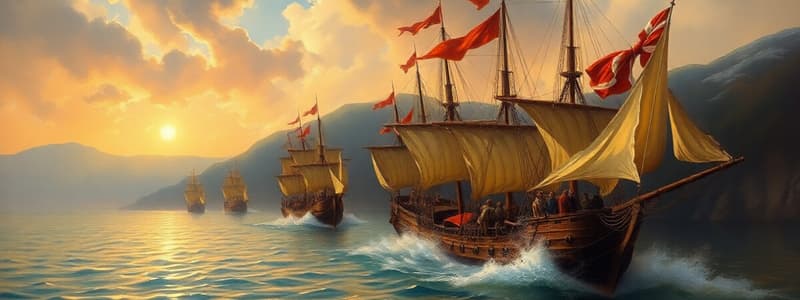Podcast
Questions and Answers
Which of the following best describes the 'Eastern Question' that arose in the 18th century?
Which of the following best describes the 'Eastern Question' that arose in the 18th century?
- The debate over which European power should control the entirety of North Africa.
- The economic policies that would best integrate the Ottoman Empire into the European trade system.
- The question of whether the Byzantine Empire should be restored to its former glory.
- The strategic and political issues arising from the decline of the Ottoman Empire. (correct)
How did the Enlightenment and the French Revolution influence the Greek War of Independence?
How did the Enlightenment and the French Revolution influence the Greek War of Independence?
- By promoting religious tolerance within the Ottoman Empire, thus reducing the rationale for a Greek revolt.
- By spreading ideals of nationalism and self-determination that inspired Greeks to seek independence. (correct)
- By encouraging economic alliances between the Ottoman Empire and European powers, which strengthened Ottoman control over Greece.
- By reinforcing the legitimacy of monarchical rule, making Greek revolutionaries seek support from other empires.
What was the primary objective of the Filiki Eteria in initiating the Greek revolt?
What was the primary objective of the Filiki Eteria in initiating the Greek revolt?
- To integrate Greece into the Russian Empire as an autonomous region.
- To revive the Byzantine Empire with Constantinople as its capital. (correct)
- To create an independent Greek state focused solely on economic development.
- To establish a constitutional monarchy under the protection of Great Britain.
Which of the following factors contributed to the decline of the Ottoman Empire in the 18th century?
Which of the following factors contributed to the decline of the Ottoman Empire in the 18th century?
What was the significance of the Battle of Navarino in 1827 during the Greek War of Independence?
What was the significance of the Battle of Navarino in 1827 during the Greek War of Independence?
How did Russia's involvement in the Greek War of Independence reflect its broader geopolitical strategy?
How did Russia's involvement in the Greek War of Independence reflect its broader geopolitical strategy?
Besides the rise of nationalism, what other significant global trend is exemplified by the Greek War of Independence?
Besides the rise of nationalism, what other significant global trend is exemplified by the Greek War of Independence?
What was the long-term impact of the Treaty of Adrianople (1829) on the Ottoman Empire?
What was the long-term impact of the Treaty of Adrianople (1829) on the Ottoman Empire?
What was the significance of the Battle of Navarino in the Greek War of Independence?
What was the significance of the Battle of Navarino in the Greek War of Independence?
How did the Greek Enlightenment (Diafotismos) contribute to the Greek War of Independence?
How did the Greek Enlightenment (Diafotismos) contribute to the Greek War of Independence?
How did intellectuals like Rigas Feraios and Adamantios Korais influence the Greek nationalist movement?
How did intellectuals like Rigas Feraios and Adamantios Korais influence the Greek nationalist movement?
The 'Eastern Question' primarily concerned what?
The 'Eastern Question' primarily concerned what?
What was the significance of the Treaty of Adrianople in 1829?
What was the significance of the Treaty of Adrianople in 1829?
How did the atrocities committed during the Greek War of Independence impact European sentiment?
How did the atrocities committed during the Greek War of Independence impact European sentiment?
What broad impact did the recognition of Greek independence have on European nationalism?
What broad impact did the recognition of Greek independence have on European nationalism?
What internal issue contributed to the weakening of the Ottoman Empire and subsequent rise of nationalism?
What internal issue contributed to the weakening of the Ottoman Empire and subsequent rise of nationalism?
How did the defeat of the Ottoman fleet at the Battle of Navarino affect the balance of power in Europe?
How did the defeat of the Ottoman fleet at the Battle of Navarino affect the balance of power in Europe?
What was a primary characteristic of the Ottoman Empire's early expansion?
What was a primary characteristic of the Ottoman Empire's early expansion?
Flashcards
Ottoman Empire
Ottoman Empire
Founded in the late 13th century, it became a major power by the 16th century.
Eastern Question
Eastern Question
The question of what would happen to the Ottoman Empire as it weakened.
Greek War of Independence
Greek War of Independence
A war fought from 1821-1829 where Greeks sought independence from Ottoman rule.
The Enlightenment
The Enlightenment
Signup and view all the flashcards
French Revolution
French Revolution
Signup and view all the flashcards
Rigas Feraios
Rigas Feraios
Signup and view all the flashcards
Filiki Eteria
Filiki Eteria
Signup and view all the flashcards
Battle of Navarino
Battle of Navarino
Signup and view all the flashcards
War Atrocities
War Atrocities
Signup and view all the flashcards
Treaty of Adrianople
Treaty of Adrianople
Signup and view all the flashcards
Ottoman Transformation
Ottoman Transformation
Signup and view all the flashcards
The Eastern Question
The Eastern Question
Signup and view all the flashcards
Greek Enlightenment
Greek Enlightenment
Signup and view all the flashcards
Enlightenment Thinkers
Enlightenment Thinkers
Signup and view all the flashcards
Post-Navarino Geopolitical Shifts
Post-Navarino Geopolitical Shifts
Signup and view all the flashcards
Emergence of Nationalism
Emergence of Nationalism
Signup and view all the flashcards
Key Themes
Key Themes
Signup and view all the flashcards
Study Notes
- The video examines the Greek fight for independence from the Ottoman Empire.
- The "Eastern Question" emerged alongside the decline of the Ottoman Empire in the 18th century.
- This question concerned the empire's fate and the desires of various nationalities, particularly in the Balkans.
Causes of the Greek War of Independence
- Greek nationalism was on the rise, influenced by the Enlightenment and the French Revolution.
- Rigas Feraios advocated for unification and liberation.
- Adamantios Korais envisioned a democratic Greece.
- The Filiki Eteria, was a secret society of Greek merchants.
- The Filiki Eteria played a key role in organizing the revolt.
Key Events and Figures
- Brutal atrocities occurred on both sides of the conflict.
- European powers, especially Russia, offered support to the Greek revolutionaries.
- Russia aimed to expand its influence at the expense of the Ottomans.
- The Battle of Navarino in 1827 was a turning point.
- The Treaty of Adrianople in 1829 led to the recognition of Greek independence.
Significance
- The war symbolized the rise of nationalism.
- The war highlighted shifting dynamics in Europe.
- The Greek struggle had broader implications for the balance of power among the Great Powers.
Foundation and Decline of the Ottoman Empire
- The Ottoman Empire was founded in the late 13th century by Osman.
- The empire became a transcontinental power after the capture of Constantinople in 1453.
- By the 18th century, the empire experienced a decline, leading to the "Eastern Question".
- The "Eastern Question" focused on the empire's future and the national aspirations of its subjects.
Greek Nationalism
- Greek nationalism rose from 1821 to 1829.
- The secret society Filiki Eteria advocated for the revival of the Byzantine Empire and aimed to restore Constantinople as its capital.
War Atrocities and International Intervention
- The war included atrocities like the Constantinople Massacre of 1821.
- The atrocities garnered outrage and support for the Greek cause.
- Britain, France, and Russia defeated the Ottoman fleet at the Battle of Navarino in 1827.
- The Battle of Navarino led to Greek independence.
- The Treaty of Adrianople in 1829 recognized Greek independence.
- The Treaty of Adrianople marked a significant moment in the dismemberment of the Ottoman Empire.
Transformation of the Ottoman Empire
- Early expansion led to a complex, multicultural empire.
- The Ottomans influenced regional politics and facilitated cultural exchange.
- The diverse empire also sowed discontent among subject nations, leading to nationalist movements as the empire weakened.
Complexity of the Eastern Question
- It encapsulated rising nationalism in the Balkans.
- It showed the declining authority of the Ottoman Empire.
- The question highlighted the competing interests of European powers.
- The phrase reveals the intricate tapestry of geopolitical concerns shaping 19th-century international relations.
Cultural Awakening and National Identity
- The Greek Enlightenment, or Diafotismos, shaped national identity among Greeks.
- A wealthy merchant class and educated elites fostered revolutionary ideas.
- Cultural movements preceded and inspired political change.
- Intellectuals like Rigas Feraios and Adamantios Korais promoted liberty, democracy, and national identity.
- Their writings served as vital catalysts for the Greek nationalist movement.
- Literature and education can spark revolutionary sentiments.
Atrocities of War
- The war was marred by violence and brutality.
- Atrocities fueled outrage among Europeans.
- Atrocities highlighted the human cost of the struggle for independence, complicating international responses.
Geopolitical Shifts Post-Navarino
- The Battle of Navarino marked a turning point for Greece and the balance of power in Europe.
- The Ottoman fleet's defeat demonstrated the collective military strength of European powers.
- There was a shift in European involvement, emphasizing external influences in national movements.
- The recognition of Greek independence represented a milestone in European nationalism.
- It provided a template for other nations under imperial rule.
- It altered the political landscape of the continent.
- It challenged the existing order established by the Congress of Vienna.
Conclusion
- The Greek War of Independence embodies the struggles and aspirations of a people under foreign dominion.
- The complexities surrounding the “Eastern Question” resonate in discussions of national sovereignty and the legacy of empires.
Studying That Suits You
Use AI to generate personalized quizzes and flashcards to suit your learning preferences.




